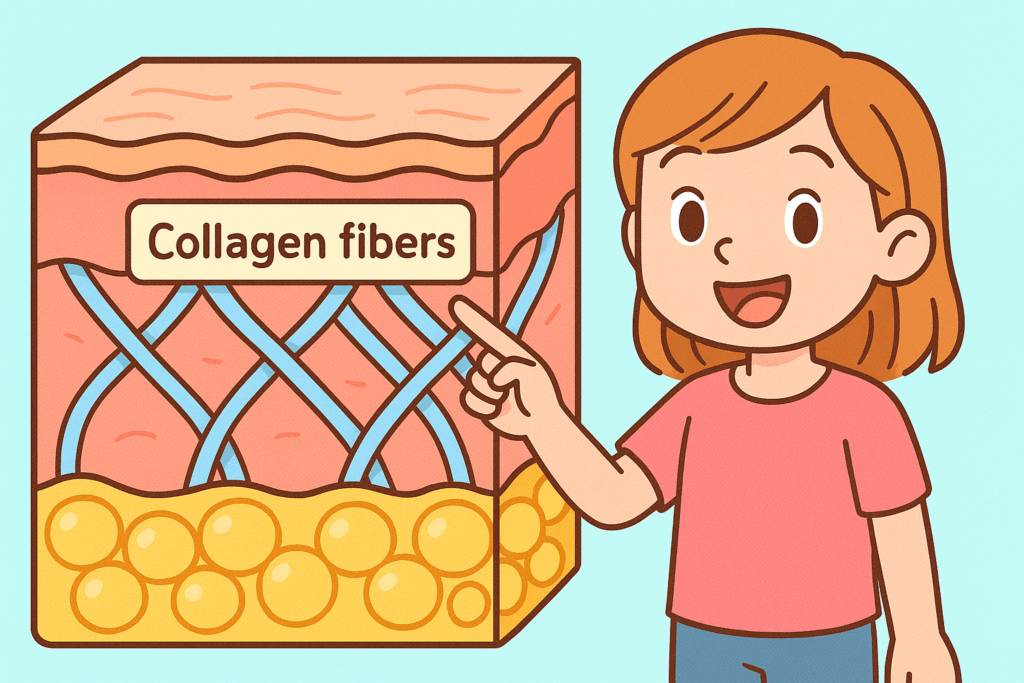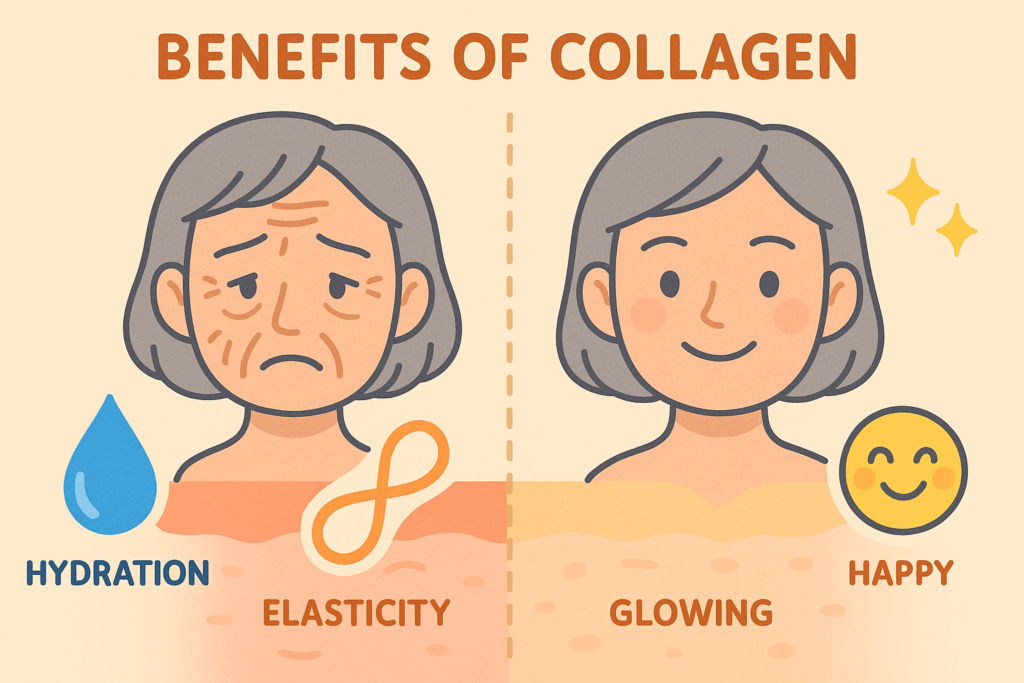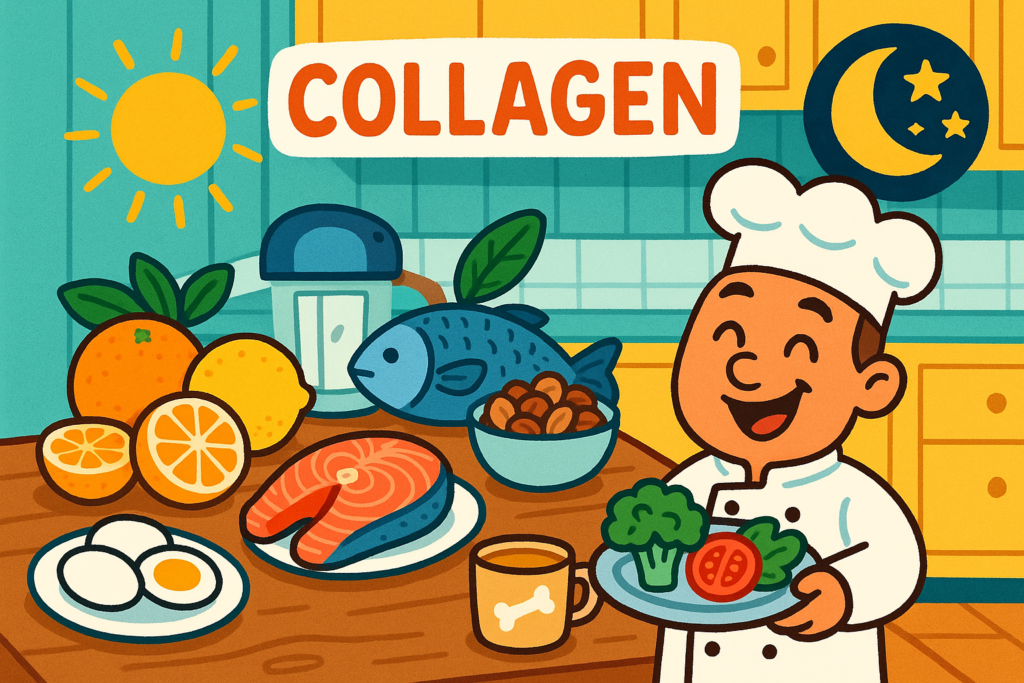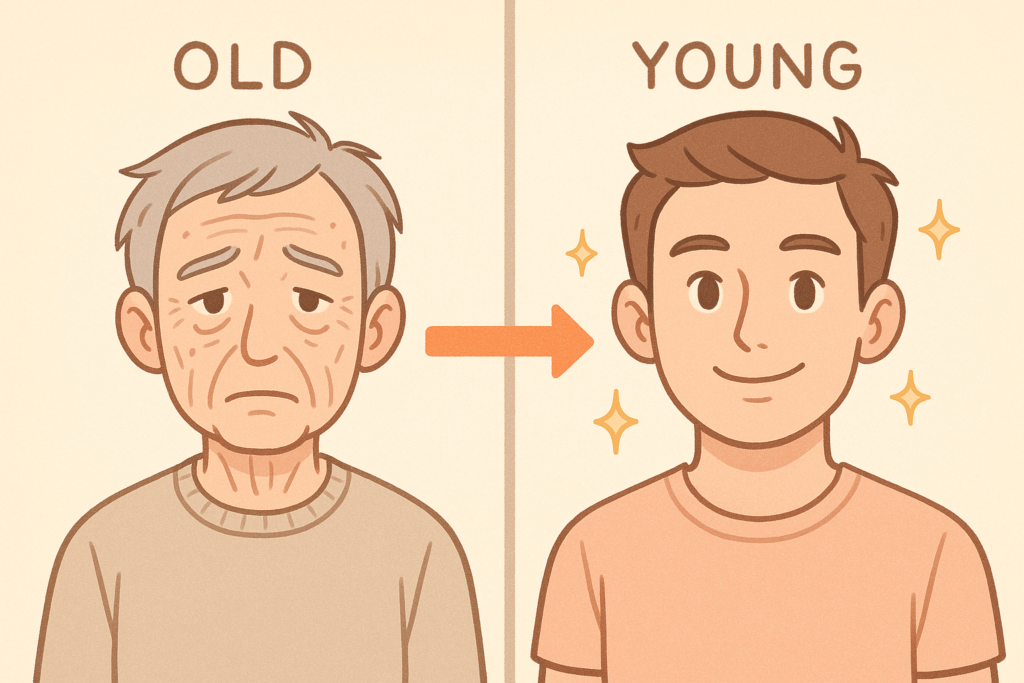When we talk about glowing, youthful, and healthy skin, one word that always comes up is collagen. People often ask – what does collagen do for skin and how to naturally boost it? This question matters because collagen is the foundation that keeps our skin firm, elastic, and radiant.
In this blog, we’ll dive deep into what collagen really is, how it benefits your skin, what happens when it decreases, and most importantly — how you can naturally boost it without relying only on supplements.
1. What is Collagen and Why is it Important for Skin?
Collagen is the most abundant protein in the human body. It makes up a huge part of our skin, bones, tendons, and connective tissues. You can think of collagen as the “scaffolding” that supports your skin — just like steel rods that hold a building together, collagen holds your skin in place.
When we are young, collagen production in our body is at its peak. That’s why children and young adults have soft, plump, and tight skin. However, after the age of 25, the production of collagen starts to slow down. By the time we reach our 30s, fine lines, sagging, and dullness become more visible.
But age isn’t the only factor. Lifestyle habits like smoking, alcohol, excess sugar intake, pollution, and unprotected sun exposure also damage collagen fibers. These external factors break down collagen much faster, making skin look older than it should.

So, when you think of what does collagen do for skin and how to naturally boost it, the first answer is clear: collagen is the essential building block that keeps your skin youthful, hydrated, and firm.
2. What does Collagen do for Skin – Key Benefits
Now let’s break down the specific ways collagen impacts your skin health.
1. Maintains Skin Elasticity
Collagen provides the skin its flexibility. It allows your skin to stretch and bounce back to its original shape. Without enough collagen, skin becomes loose and saggy.
2. Reduces Wrinkles and Fine Lines
When collagen levels are high, your skin looks plump and smooth. As collagen reduces, wrinkles and fine lines appear more prominently because the skin loses its support.
3. Improves Hydration
Collagen molecules have the ability to retain water, which helps keep your skin soft, moisturized, and supple. That’s why hydrated, glowing skin is often linked to good collagen levels.

4. Boosts Skin Repair
Whenever you get a cut, scar, or injury, collagen is what helps heal and repair the damaged tissues. Without enough collagen, wounds take longer to heal.
5. Enhances Skin Texture
Healthy collagen production results in a smoother skin surface, making it look radiant and healthy instead of rough and uneven.
Fasting and cortisol impact – Benefits and Cautions
So, to summarize — if someone asks what does collagen do for skin, the simplest answer is: it makes your skin firm, smooth, hydrated, and youthful.
3. How to Naturally Boost It – Proven Ways
While collagen supplements are popular, the good news is that your body can produce collagen naturally if you give it the right nutrition and lifestyle support.
(A) Through Diet
- Protein-rich foods: Chicken, fish, eggs, dairy, beans, and lentils are all packed with amino acids that build collagen.
- Vitamin C: Essential for collagen synthesis. Citrus fruits, strawberries, guava, kiwi, and bell peppers are great sources.
- Zinc and Copper: Found in nuts, seeds, and whole grains, these minerals help activate collagen production.
- Bone broth: A natural superfood that contains collagen peptides directly, supporting skin and joint health.

(B) Through Lifestyle Habits
- Protect from Sun: UV rays directly damage collagen fibers. Always use sunscreen when stepping outside.
- Avoid Smoking and Alcohol: These toxins break down collagen and accelerate aging.
- Limit Sugar: Excess sugar causes “glycation,” making collagen stiff and weak, leading to dull skin.
- Get Quality Sleep: During deep sleep, your body repairs itself and produces fresh collagen.
- Manage Stress: Chronic stress increases cortisol, which interferes with collagen production.
(C) Through Skincare and Treatments
- Vitamin C serums: Help stimulate collagen production when applied topically.
- Retinol creams: Retinol activates fibroblasts (skin cells responsible for collagen synthesis).
- Micro-needling: Tiny controlled injuries encourage the skin to heal and produce new collagen.
- Laser therapy: Uses heat to boost collagen regeneration.
- LED Red Light Therapy: Energizes skin cells to naturally increase collagen levels.
In short, if someone asks how to naturally boost it, the answer is simple — nourish your body from the inside with the right foods, protect it from harmful external factors, and use smart skincare methods that support collagen.

4. Collagen and Aging – Why You Should Care
The relationship between collagen and aging is undeniable. After the age of 25, collagen production naturally decreases by about 1% every year. While this decline may seem small, it adds up over time. By the mid-30s, the skin starts showing visible signs of aging like wrinkles, dryness, and sagging.
But lifestyle choices can either slow down or speed up this process. For example:
- A person who follows a nutrient-rich diet, wears sunscreen, and avoids smoking will maintain healthier collagen for longer.
- On the other hand, someone exposed to constant sunlight, stress, and poor diet habits may notice collagen breakdown much faster.
This is why focusing on collagen early in life is a long-term investment for your skin. So, the next time you wonder what does collagen do for skin and how to naturally boost it, remember: it’s not just about looking younger, it’s about keeping your skin strong and healthy for decades to come.
5. FAQs
Q1. Do collagen supplements really reduce wrinkles?
Yes, consistent intake of collagen peptides for a few months has shown improvements in skin hydration, firmness, and reduced wrinkle depth.
Q2. Do collagen creams actually work?
Most collagen creams don’t penetrate deep into the skin because collagen molecules are large. They mostly provide hydration on the surface.
Q3. Can diet alone boost collagen naturally?
Absolutely. A balanced diet rich in protein, vitamin C, zinc, and copper can naturally support collagen production in the body.
Q4. Does microneedling or laser therapy help with collagen?
Yes, these treatments activate skin cells and stimulate the production of fresh collagen, leading to firmer and smoother skin.
Q5. Is collagen only important for skin?
No. Collagen also plays a major role in maintaining healthy joints, bones, and muscles. But its impact is most visible on skin.
